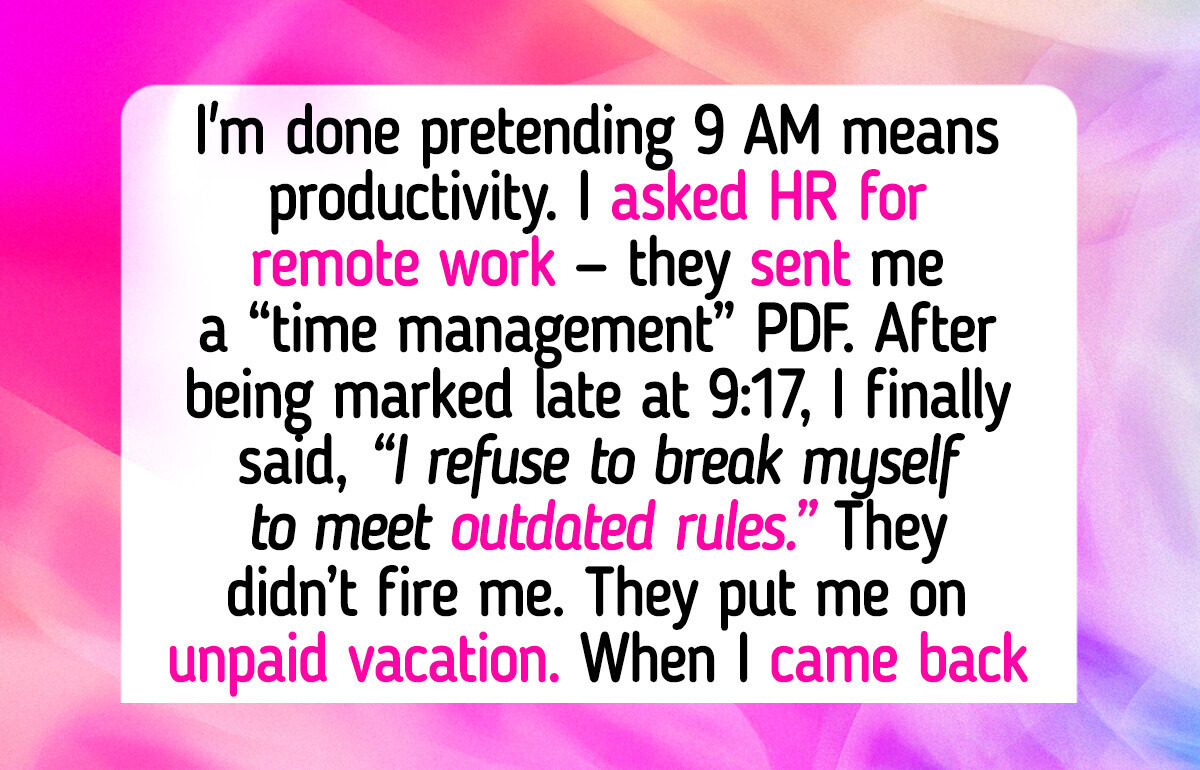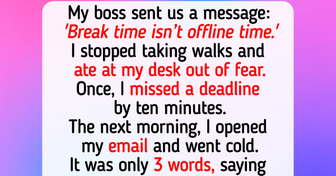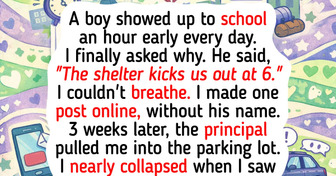Well they ended up giving you what you were whining for all along. Did you think you'd get a raise?
I Refuse to Be in the Office by 9 AM—I’m Burned Out, and HR’s Policies Are Stuck in the Past

Some workplace stories don’t begin with loud crises — they begin with quiet exhaustion. One of our readers wrote to us about a different kind of breaking point: not a resignation, but a refusal. A refusal to keep trading health for punctuality, and humanity for policy.
Her story isn’t just about burnout — it’s about what happens when a company demands more from a person than it’s willing to give back.
The letter:
Hi Bright Side,
I’m done pretending 9 AM means productivity. I used to show up early, smiling, coffee in hand, thinking it made me a “team player.” In reality, I was dying inside.
Burnout isn’t loud — it’s silent. It’s sitting at your desk at 9:02 AM wondering why you want to cry.
I asked HR about flexible hours or remote work. They sent me a PDF on “time management.”
When I mentioned burnout, they said, “Have you tried yoga?”
Yoga? I haven’t felt rested in years.
The final straw was being marked “late” for arriving at 9:17 after a night finishing a project due the next week. No thank you. No raise. Just a warning.
So I said it — out loud this time: “I refuse to keep breaking myself to meet outdated rules.”
HR didn’t like that. My manager called it an “attitude problem.” Funny. They love calling this place a “family” — until you ask for basic humanity.
The next day, I got an email: They put me on unpaid vacation.
No discussion. No timeline. Just “take time to reflect.”
They didn’t fix anything. They just removed me like a problem.
When I came back, HR smiled like nothing happened, said, “We’re so glad you’re feeling better,” and handed me a new contract — shorter hours, smaller pay, and a clause about “team alignment.”
I realized then: they never wanted me rested. They wanted me quiet.
So tell me, was I wrong for not staying silent?

We want to thank our reader for having the courage to share this experience. Burnout is often hidden behind smiles and “I’m fine,” yet it weighs heavily on so many. By speaking out, you give a voice to those who sit at their desks every morning, wondering when care became a privilege.
What to Do If Your Flexible Working Request Is Refused.
1️⃣ Ask for a Written Reason
Your employer must explain why they refused. Don’t settle for vague answers like “not possible” — you’re entitled to a clear explanation.
2️⃣ Appeal the Decision
Most companies have an appeal process. Use it. This shows you’re serious and gives them a chance to correct a rushed or unfair decision.
3️⃣ No Appeal? You Can File a Grievance
If there’s no formal appeal process, you can still ask them to review their decision or raise a grievance. You have that right.
4️⃣ Know Your Legal Options
If your request was a formal (statutory) one, you may be able to take it to an employment tribunal — especially if:
They didn’t reply within 2 months.
They refused without a valid reason.
You believe discrimination is involved.
5️⃣ Keep Working While It’s Ongoing
Even if you feel ignored, don’t stop working your agreed hours. Walking out could risk your position — protect yourself first, emotionally and legally.
6️⃣ When It Becomes Discrimination
If your request was refused because you’re a parent, caregiver, pregnant, disabled, or dealing with health issues — that could be discrimination, and you can challenge it.
Remember This
Wanting flexible work isn’t laziness. It’s choosing to protect your health, your family, or your well-being. No policy should make you feel guilty for being human.
In this case, our reader had every right to ask for temporary remote work. Burnout isn’t solved by stricter schedules or hollow “wellness” tips; it’s prevented by empathy, flexibility, and trust. Wanting space to recover and work sustainably isn’t unreasonable — it’s responsible. The real problem isn’t the request, it’s a system that punishes people for being human.
Global Remote Work Statistics in 2025

In 2020, only 20% of employees worldwide worked remotely.
By 2023, that number rose to 28%, and in 2025, it reached 48%.
In the United States, over 32.6 million people now work remotely, making up 22% of the national workforce.
Hybrid work is the most preferred model.
83% of employees want a mix of remote and office days.
38% already work remotely at least part of each week.
The technology sector leads in remote work, with 67% of tech employees working primarily from home as of 2023.
Support from top employers is strong:
97 of the top 100 most employee-friendly companies now offer remote or hybrid options.
In Eastern countries, 52% of remote-capable employees follow a hybrid schedule.
Leadership attitudes are shifting:
88% of executives managing hybrid/remote teams have no plans to enforce full office returns.
Overall, 90% of companies say remote work is permanent or expanding in their organization.
Remote work has led to measurable productivity gains. Remote employees perform 13 to 40% better, driven by more flexible schedules.
Work will keep evolving, but one thing is clear: people don’t just want flexibility — they need to be treated like people.
Comments
try going to the office at 7 am like I have to 🤣
Outdated? You show up when told to. If you can't handle that responsibility then quit and get a good psychiatrist.
Just work your normal hours and then leave. They'll learn to compromise when things start going downhill.
Related Reads
My Dad Refused to Come to My Wedding, but I Still Asked for the Gift

I Kicked Out My Sister and Her Son After His Behavior Crossed a Line

15 Real-Life Moments That Prove Quiet Kindness Is a Real Power Move

10 Bosses Whose Unrealistic Demands Led to a Disaster

10 Times a Moment of Pure Cruelty Was Actually a Secret Act of Kindness

I Refuse to Return to the Office After My Coworker’s ‘Prank’ Revealed His Darkest Secret

My Cousin Uninvited Me to Save Money—My Petty Revenge Was Absolutely Worth It

10 Teachers Who Learned Life Lessons From Their Remarkable Students

15 Times Someone Showed Kindness Without Saying Anything

I Found Out My MIL Was Sabotaging My Gender Reveal—Now I’m the Family Villain

I Refused to Talk to My Parents After They Chose My Ex-Wife Over Me

12 Moments That Show Romance Is Really About Small Acts of Kindness
